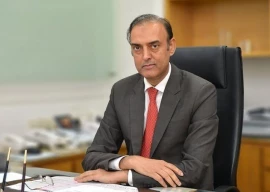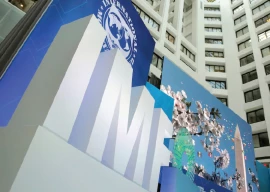
As Pakistan faces pressure from the International Monetary Fund (IMF) to make loans (for the private sector) expensive by notching up the minimum interest rate to double digits, the government has not yet convened a meeting of the Monetary and Fiscal Policies Coordination Board.
The Ministry of Finance has not yet convened a “legally binding” meeting of the Monetary and Fiscal Policies Coordination Board, according to sources in the economic advisory wing of the ministry.
The State Bank of Pakistan (SBP) Act, 1956, binds the Finance Ministry to call a meeting of the coordination board every quarter. The last meeting of the board was held in January.
The Washington-based lender’s push for interest rate hike is aimed at convincing Pakistan to adopt a contractionary monetary policy that the Fund believes is necessary for economic stabilisation – a policy that independent economists say will cost the country economic growth and development.
Delays in convening the meeting will leave no other option for the central board of directors of the SBP than to agree on monetary policy in isolation in its upcoming meeting. The SBP is expected to meet in the last ten days of August to announce the country’s monetary policy for the next two months.
All eyes are set on the SBP’s board, which will meet just a few days before the meeting of the executive board of the IMF to consider Pakistan’s request for a $7.3-billion bailout package.
Sources said the IMF had asked the government to increase the discount rate – the minimum rate at which the central bank lends money to the commercial banks – by 100 basis points to 10%. In its last meeting, the SBP had slashed the discount rate by 50 basis points to 9% while arguing that inflation had been falling and economic growth was “too anemic”.
Pakistan has been trying to convince the IMF to hold-up its monetary policy advice for a few months, but the lender has not agreed yet. SBP’s monetary policy, though a key pillar, will be one of half a dozen prior actions that will help determine the size of the bailout package, sources said.
Sudden rebound in inflation to 8.3% in July and massive government borrowings from the central bank can be used as a basis to increase the interest rates, making IMF’s case stronger to ask for the uptick. Sources say that the IMF had questioned Pakistan’s monetary easing (expansionary monetary policy), despite wider fiscal deficit and serious problems in financing the current account deficit, the sources added.
Monetary policy is closely linked with a country’s fiscal policy and recent developments on the economic front, because of which there was an urgent need of the meeting of the Monetary and Fiscal Policies Coordination Board, according to a government functionary.
Summoning a meeting of the board is the responsibility of the finance ministry. The board is chaired by the finance minister, with other members being the commerce minister, deputy chairman of the planning commission, the SBP governor and the finance secretary. Two eminent macro and monetary economists, former governor of the SBP Dr Ishrat Husain and former IMF official Mohsin Khan, are also be on the board.
However, the board still remains incomplete as Prime Minister Nawaz Sharif had not yet appointed a commerce minister.
The spokesperson of the finance ministry was not available to comment on reasons for the unwarranted delays and the condition of the IMF to notch up the interest rate.
The urgency of calling the meeting has intensified after the government faced serious problems of rebounding inflation, declining tax revenues and repercussions of expansionary fiscal policy from the very first month of the new fiscal year.
In July, the Federal Board of Revenue missed its monthly revenue target. The government borrowed Rs400 billion from the SBP till July26, out of which it retired Rs292.8 billion to commercial banks and the rest of the amount was used for budget financing.
Published in The Express Tribune, August 14th, 2013.
Like Business on Facebook, follow @TribuneBiz on Twitter to stay informed and join in the conversation.
COMMENTS (9)
Comments are moderated and generally will be posted if they are on-topic and not abusive.
For more information, please see our Comments FAQ


1732085354-0/insta-(1)1732085354-0-165x106.webp)

1725366721-0/kyle-(1)1725366721-0-165x106.webp)
1732084432-0/Untitled-design-(63)1732084432-0-270x192.webp)











@Hedgefunder: well you have brought in many things on which i dont not disagree but at the same time they diverge from the main topic of inflation and interest rates.
as far as the reimbursement of military operations is concerned, the cost was initially borne by our own government and thus its domestic effects on inflation cannot be sidelined. the reimbursement came much later. in some cases, it took a period of more than a year. all other things related to non productive state enterprises, i dont disagree.my earlier comment was primarily focused on why decreasing the interest rates by the SBP was the right thing to do. even now, if the inflation pressure does not build up in response to the rise in sales tax and withdrawal of subsidies, there is no need to go for anti growth policy of increasing interest rates. you are complaining about the industry but at the same time ignoring the costs of finance associated with the growth of industry. given most of our industries rely on informal or banking channels to finance there projects instead of IPOs, it is detrimental that the cost of borrowing be increased without any necessity. we complain about low FDI because of law and order but then go on to discourage even the domestic investment by talking about increasing interest rates in the time of almost zero GDP per capital growth for over last 5 years.
For once, we should let the government make their own decisions and not succumb to foreign pressures. The reduction in interest rate will inevitably force banks to lend to the private sector and consumers. Basic economics teaches us that increasing money supply will create demand in the economy, therefore paving a path for expansion and growth.
As for the argument of increasing inflation, economic prosperity can not be achieved without a certain percentage of inflation in the economy. We should just accept it as a minor speed-bump on the road to future growth!
@Ahmed Jamal Pirzada: Acknowledge your comment, however let's try and break it down a bit and reality is not what you see. Firstly the Army's operation's cost have been covered by US in various forms, and yet even these were with inflated invoices for services rendered ! Next the IMF deals, which were blatantly abused by previous admin in form what was expected of FDR and achieved rates ! The state owned industries are basically non productive and a huge liability to the coffers of the state and yet they continue to operate and drain money's the state simply do not have ! The basic industrial production is virtually at stalemate, due to the energy crises or due to huge flood of cheap import from China. Now please enlighten me as how the simple basic problems are likely to be solved? As an Banker of over 40 years experience its a hard call to convince me, that Pakistan PLC as a business can ever deliver let alone survive economically without hand-outs, yet its a Nuclear powered state, with Jihadis round the corner and expects the rest of the world to keep bailing it out ! Lastly the circular debts issue facing the energy companies is simply ghastly ! The future is extremely bleak for this Country, whether its economically or politically ! And rest assure I am an optimist and committed my funds to save some of the western banks, to maintain stability . The sad thing is that those who Pakistan has chased and kissed are not interested in saving them financially .
@Hedgefunder yup i do. that is not because of the honesty of our institutions but due to underlying economic sense. our economy has not experienced any major price shock in the form of IDPs, nationwide floods, large scale military operation etc (a major reason for government borrowing from SBP). Earlier inflation was driven mostly by these factors in addition to removal of subsidies and global commodity prices. with none of these factors present (apart from withdrawal of subsidies) and given the close to zero GDP growth per capita, inflation was expected to fall no matter what. Furthermore, State Bank study showed that aggregate inflation persistence in Pakistan has only been 0.19 for the period of 1959-2011 which has become statistically insignificant for the most recent period of 2001-2011. This means that the impact of the previous shocks has already been felt at the aggregate level with little lag and thus the fall in the aggregate inflation level to 7.66% (during previous year) was justified.
@Ahsan Jamal Pirzada: Do you actually believe in the figures presented by your managers of economy ? The smart money in EU suggests not !
IMF questioning of monetary policy easing was based on their inflation projection of double digits for the previous year. but they have been proven wrong with regards to their inflation forecast. With growth stumbling and inflation falling, SBP was right in decreasing interest rates. even now, without strong evidence for upward pressure on inflation, it will be very unwise to give into this demand of increasing interest rates. the only other reason for increasing interest rates is dwindling foreign reserves. but then what is the purpose of taking this IMF loan if it is not to provide a breather during which one could boost growth by adopting expansionary policies? moreover, what happens to the independence of SBP if interest rates are to be dictated out of the analysis done in Washington?
This Country has always done reverse of what it promises to do at the time of meetings and loan negotiations. They have lost basic fundamentals of economics, and seriously lack any serious ideas as to their fiscal policy. The previous regime's solution was always to keep printing money, now let's see as to what this government does. The smart money is on, not lot is likely to change in five years !
Double digit interest rates, extraordinary hike in industrial power tariffs. No doubt PML(N)'s government is an Industry friendly government. If this is their friendliness, what would be their animosity. Just imagine !!!